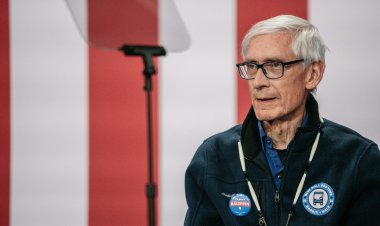No Labels aims to hit the 'reset button' following Trump's win
In a recent statement, Rep. Jared Golden (D-Maine) emphasized, “It cannot be about loyalty to their party.”

On Thursday, hundreds gathered in Washington for the annual meeting of the centrist organization No Labels, aiming to carve out a path for the "power of the middle" amid growing partisan divisions and leading up to Trump’s anticipated return as President.
Founded in 2009, the group promised to allocate tens of millions to thwart Trump, and they endeavored to secure ballot access for a “Unity” candidate in the 2024 election. However, after their search for candidates with a viable chance to win the presidency stalled in April, the conference on Thursday still drew around two dozen lawmakers from both parties.
“I am honestly energized and be here with you after this election,” stated Rep. Jared Golden, a Democrat from a Maine district that Trump won by almost 10 points. “This feels like an opportunity to hit the reset button on what we know has gone wrong with our politics in recent years.”
“Members of Congress need to come to Washington loyal to their districts, their constituents and their states — and loyal to our country,” Golden added. “It cannot be about loyalty to their party.”
Despite the enthusiasm surrounding shared, pragmatic ideas, the specter of primary challenges was ever-present. Trump's MAGA supporters have already suggested potential primary threats to more independent-minded senators who might oppose some of his contentious Cabinet nominees.
“The approach is going to be: Everybody tow the line. Everybody line up. We got you here, and if you want to survive, you better be good. Don't get on Santa's naughty list here, because we will primary you,” remarked Sen. Lisa Murkowski, a Republican from Alaska who expressed feeling “more comfortable” without a party label.
Sen. John Curtis, a newly elected Republican from Utah who succeeded Mitt Romney, mentioned, “I talked to a sitting senator today who has what feels like the entire world coming after her, because she may or may not support one of the Trump nominees.”
While he didn't specify, Curtis appeared to reference Republican Sen. Jodi Ernst of Iowa, who has indicated potential opposition to the confirmation of Pete Hegseth, a former Fox News host, to head the Pentagon. The pressure campaign from MAGA supporters targeting Ernst has been intense, including threats of primary challenges.
During the campaign, Democrats depicted Trump as an “unhinged” fascist, while Republicans labeled Vice President Kamala Harris a “radical Marxist.” Yet at the conference, participants underscored the significance of bipartisanship and collaboration.
Rep. Don Bacon proposed establishing a bipartisan commission focused on addressing the national debt, while Curtis argued that two Democrats and two Republicans, through a secret ballot, could “solve immigration” “in an afternoon.”
However, they also recognized that bipartisan initiatives often come with challenges, exposing lawmakers to potential harassment from party loyalists or primary contenders.
Curtis described the pressure he faced when deciding to run for Senate, with some political consultants urging him to move further to the right, claiming it was his only shot at surviving the primary. Despite its initial reputation as a Never-Trump stronghold, Utah has largely moved into Trump’s orbit.
Democrats are not facing the same direct threats from Trump, which has opened the door for some party members critical of their own leadership to assert their concerns and enhance their centrist credentials.
Rep. Seth Moulton, who faced significant backlash from his party last month over his comments on trans athletes, reiterated his views on Thursday, asserting that his party has “worked so hard to become so tolerant of every little narrow group that as a whole, we've become intolerant if we don't check the box.”
“I already have a couple people planning to run against me in the primary,” Moulton noted. “I'm being primaried over a sentence.”
The recent election defeat has empowered Democrats to voice their criticisms as the party looks for a way forward.
“I think Democrats have had this idea, like, ‘Well, we’re the empathetic people.’ Are you empathetic to that family who has lost multiple members this week” to fentanyl? “Are you listening to people?” questioned Rep. Marie Gluesenkamp Perez, a Democrat from a red district in Washington who recently criticized her party for neglecting working-class voters.
Several Democrats, including Gluesenkamp Perez and Rep. Ritchie Torres of New York, agreed that their party had failed to effectively address immigration issues, with Torres describing it as “the gargantuan gaslighting around the migrant crisis.”
Centrists from both parties also expressed a willingness to engage with the Department of Government Efficiency, an initiative introduced by Trump aimed at reducing regulations and minimizing government waste, led by billionaire Elon Musk and entrepreneur Vivek Ramaswamy. Sen. Susan Collins shared, “I had an excellent 70-minute meeting with Elon Musk, and I was very impressed.”
Sen. Tim Kaine, who was Hillary Clinton's running mate, echoed a similar sentiment, indicating his general support for examining the federal government's efficacy. He added, however, that he was wary of potential across-the-board cuts and proposals to relocate significant portions of the federal workforce from the D.C. area.
Anna Muller for TROIB News
Find more stories on Business, Economy and Finance in TROIB business












